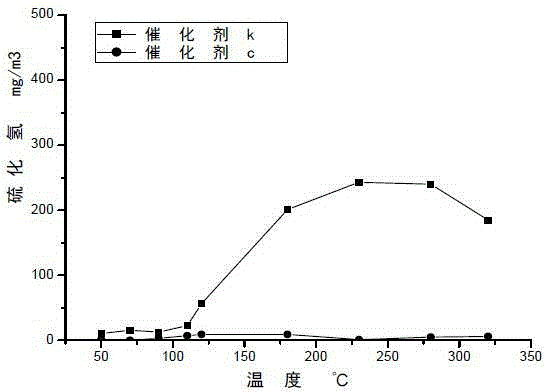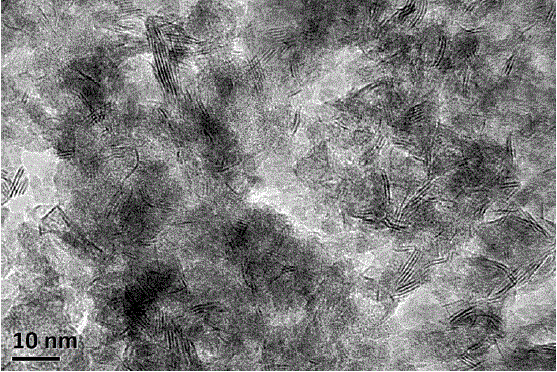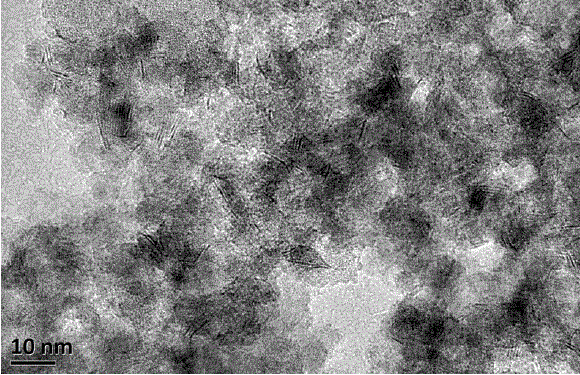Regeneration method of hydrogenation catalyst
A hydrogenation catalyst and catalyst technology, applied in the direction of catalyst regeneration/reactivation, chemical instruments and methods, catalyst activation/preparation, etc., can solve problems such as temperature rise, metal waste, and shortened start-up time in the vulcanization process, and achieve improved initial vulcanization Effect of temperature, stool storage and transportation, and improvement of dispersion state
- Summary
- Abstract
- Description
- Claims
- Application Information
AI Technical Summary
Problems solved by technology
Method used
Image
Examples
Embodiment 1
[0078] Example 1 Catalyst burning charcoal
[0079] Take a hydrodemetallization catalyst to be regenerated with a carbon deposit of 6.7wt% and a sulfur content of 7.1wt%, and perform charcoal burning in an oxygen-containing atmosphere. The specific process is as follows:
[0080] Take 500g of the hydrogenation catalyst to be regenerated, raise the temperature to 230°C at a heating rate of 3°C / min, directly pass air into it and keep the temperature at 230°C for 10 hours, then reduce the oxygen content of the oxygen-containing gas to 10%, and continue to heat up at 3°C / min heating rate, heated to 320 ° C constant temperature for 3 hours, the obtained sample was named A, and its carbon content was 1.5%.
Embodiment 2
[0081] Example 2 Catalyst burning charcoal
[0082] Take a hydrodemetallization catalyst to be regenerated with a carbon deposit of 7.8wt% and a sulfur content of 7.5wt%, and carry out charcoal-burning treatment under an oxygen-containing atmosphere. The specific process is as follows:
[0083] Take 500g of the hydrogenation catalyst to be regenerated, heat up to 200°C at a heating rate of 3°C / min, directly feed air at 200°C for 6 hours, and then continue at a heating rate of 3°C / min, the oxygen content of the oxygen-containing gas The temperature was reduced to 15%, and the temperature was raised to 350°C for 5 hours at a constant temperature. The obtained sample was named B, and its carbon content was 0.8%.
Embodiment 3
[0084] Embodiment 3 Preparation of regenerated catalyst C
[0085] Weigh 100g of sample A, dissolve 18g of 2,4,6-trimercaptotriazine triammonium salt in 20wt% ammonia solution, then spray sample A, dry in the shade in a ventilated place, and heat-treat at 250°C for 3 hours under the protection of nitrogen. The regenerated catalyst C was obtained, and its main physical properties are shown in Table 1.
PUM
| Property | Measurement | Unit |
|---|---|---|
| density | aaaaa | aaaaa |
Abstract
Description
Claims
Application Information
 Login to View More
Login to View More - R&D
- Intellectual Property
- Life Sciences
- Materials
- Tech Scout
- Unparalleled Data Quality
- Higher Quality Content
- 60% Fewer Hallucinations
Browse by: Latest US Patents, China's latest patents, Technical Efficacy Thesaurus, Application Domain, Technology Topic, Popular Technical Reports.
© 2025 PatSnap. All rights reserved.Legal|Privacy policy|Modern Slavery Act Transparency Statement|Sitemap|About US| Contact US: help@patsnap.com



